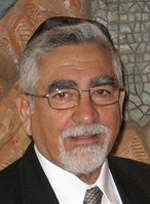We know that there is only one ending to this, only one liberation from this barbed wire hell: death. — Eddy de Wind
By Dorian de Wind
The Moderate Voice

AUSTIN, Texas –He was one of the approximately 107,000 Dutch Jewish men, women and children who were transported in train cattle wagons to a dozen or more Nazi death camps bearing the now-sinister, odious names of Auschwitz-Birkenau, Sobibor, Bergen-Belsen, Dachau, Theresienstadt, Treblinka and so on.
Once at the death camps they endured unspeakable atrocities and, for between 102,000 and 104,000 of them, a horrific death was their final fate.
By God’s Grace, he was one of the very few who survived the Nazi Holocaust atrocities and, perhaps, the only one who was able to write down a detailed record of his imprisonment and the brutalities he experienced at the very same place where they had occurred — at Auschwitz.
Atrocities and brutalities that included beatings, whippings, sexual crimes, forced sterilization, the most cruel and repulsive medical experiments, the killing of newborn babies and, finally, the gassing and other forms of murder of the young and the old, and of everyone in between.
His name was Eddie (Eliazar) de Wind.
Eddie de Wind was a young Jewish doctor specializing in psychiatry, who in 1942 volunteered to provide medical care at the Nazi “transit camp” of Westerbork (Durchgangslager Westerbork) in the northern Dutch province of Drenthe
It was his understanding that in exchange for his services his mother, the former Henrietta Sanders, would be released from the camp.
As it turned out, when Eddy arrived at Westerbork his mother had already been deported to Auschwitz.
While in Westerbork, Eddy met and fell in love with a young nurse, Friedel (Frieda) Komornik. The two married in the camp and in September 1943 they were both deported to Auschwitz.
Upon arrival at Auschwitz, Friedel and Eddy were separated. Eddy “went to work as the camp’s doctor, and Friedel at the mercy of the Nazis, facing regular medical experimentation…”
When the Nazis began evacuating Auschwitz in early 1945, as the Russians were approaching, they forced tens of thousands of prisoners to join the murderous death marches — Friedel was one of them. Eddy de Wind hid in an abandoned barracks and was one of the approximately 7,000 prisoners liberated by the Russians, most of the prisoners dying.
At the request of the Russians, Eddy stayed behind for a couple of months to take care of those too ill and too weak to go home.
It was during this period of hiding from the Nazis and staying behind at Auschwitz that Eddy wrote his manuscript for what would be published in 1946 as Eindstation Auschwitz, thought to be “the only complete book written inside [Auschwitz] itself.”
While Auschwitz tragically and literally became the Eindstation (the last station) for approximately one million human beings, Dr. Eddie de Wind not only survived that hell but recorded in situ the events of one of humanity’s worst and most heinous genocides.
Upon his return to the Netherlands, Eddy’s book was published and he went on to become one of the most respected and well-known psychiatrists and psychoanalysts in the Netherlands.
He was the author of several widely acclaimed papers on what was then called “concentratiekampsyndroom” (concentration camp syndrome) and the consequences and impact that syndrome — and what are now called “survivor’s guilt,” post-traumatic stress, “war trauma” and other similar and related syndromes — have, not only on the survivors but also on the next generation(s): “transgenerational traumatization.” They were “often a mixture of scientific observations and a committed effort to foster an understanding of what prolonged threats to life can do to a person,” according to NRC.nl.
One of his early internationally acclaimed papers is “Confrontation with Death. Psychological Consequences of Persecution.” It was published in 1949 and dealt with “the step-by-step psychic adaptation to the incomprehensible reality of the extermination camp.”
Eddy and his wife, Frieda, were eventually reunited in the Netherlands, but were divorced in 1959. Eddy then married Sonya Klijn and the couple had three children.
Eddie died in September 1987 and his death was lamented in a Nederlands Auschwitz Comité “In Memoriam” bulletin as “A great loss for all people who fight oppression and racism.”
I learned about Eddy’s “Eindstation Auschwitz” a few months ago.
I did not get the opportunity to meet Eddy, as it wasn’t until 1989 that I began to get acquainted with the Dutch and Belgian part of the de Wind family.
So, when I recently learnt about his book, I immediately went to work to try to get a copy of “Eindstation Auschwitz,” to no avail.
While I would love to read Eddy’s account of his life in the “barbed wire hell” — his rendering of the worst in humanity — and of his survival, in his own (Dutch) words, I may have to wait until January 2020 to read them in English.
On the occasion of the 75th anniversary of the liberation of Auschwitz, “Last Stop Auschwitz. My Story of Survival from Within the Camp”, will be published in several languages.
I know, Dutch-English translator, David Colmer, will do an excellent job.
Note: Eddy de Wind’s grandfather, Eliazar de Wind, and the author’s great-grandfather, Salomon de Wind, were brothers.
*
A native of Ecuador, educated in the Netherlands, Dorian de Wind is a retired U.S. Air Force officer who writes on occasion about his Dutch-Jewish heritage. This article is republished from The Moderate Voice under auspices of the San Diego Online News Association.